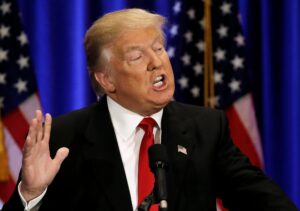Trump’s Tariffs Face Pushback: Why the U.S. Auto and Agriculture Sectors Will Force Rethinking and Exemptions
As the U.S. economy continues to feel the effects of escalating trade tensions, President Donald Trump, who is eyeing a second term in office, is facing growing pressure to adjust his approach to tariffs—particularly regarding the auto industry and agricultural imports. While his tough stance on trade has long been a cornerstone of his economic strategy, recent developments suggest that reality may force a shift in policy.
The Auto Industry’s Growing Concerns
One of the primary targets of Trump’s proposed tariffs has been the automobile sector, particularly vehicles and parts imported from Mexico, Europe, and China. While the goal has been to bolster American manufacturing, tariffs on foreign-made auto components could disrupt supply chains for U.S. automakers, leading to job losses and increased consumer costs.
Major players in the industry, including Ford, General Motors, and Stellantis, have warned that these tariffs will significantly raise the price of vehicles manufactured in the U.S., given that many critical components—such as semiconductors, transmissions, and electric vehicle batteries—are sourced internationally. The industry, already grappling with inflationary pressures and a sluggish post-pandemic recovery, is unlikely to absorb these added costs without passing them on to consumers or cutting jobs.
Trump, who has long prided himself on being a champion of the American worker, may find himself in a difficult position. If auto prices soar and factory layoffs become a reality, blue-collar voters in key swing states like Michigan, Ohio, and Pennsylvania—crucial to his victories—could reconsider their support.
Industry leaders are now lobbying aggressively for exemptions on imported parts and components, arguing that an overly rigid tariff regime will backfire, harming American businesses rather than helping them.
The Agricultural Sector’s Push for Exemptions
Similarly, the agricultural industry is sounding alarms over Trump’s tariff policies, particularly concerning imports from Mexico, Canada, and South America. Many American farmers rely on imported fertilizers, animal feed, and seasonal produce to keep their operations running efficiently. Tariffs on these goods would drive up costs for U.S. farmers, many of whom are already struggling with high interest rates and labor shortages.
Moreover, retaliatory tariffs from trading partners could further hurt American agricultural exports. China, Mexico, and Canada—three of the largest buyers of U.S. farm products—have all signaled they may respond to any new tariffs with countermeasures of their own. This could severely impact American soybean, pork, and dairy producers, many of whom still recall the economic pain inflicted during Trump’s first-term trade war with China.
Farm state lawmakers, including many Republicans, are urging Trump to carve out exceptions for agricultural imports essential to U.S. food production. Without such exemptions, domestic food prices could spike—an outcome that would not sit well with voters already frustrated by grocery store inflation.
Political and Economic Pressures Mount
The political calculus for Trump is becoming clear: if he sticks to his hardline tariff policies without exemptions, he risks alienating key constituencies that have traditionally supported him. The auto and agriculture sectors represent millions of jobs and billions in economic activity, making them too significant to ignore.
In response to these pressures, Trump’s advisors are reportedly considering a system of exemptions or waivers that would allow for key imports while maintaining the broader protectionist stance he has championed. This approach would enable him to claim victory on trade without causing major disruptions to the U.S. economy.
As we move further, expect these discussions to intensify. Trump must strike a delicate balance between appealing to his base’s nationalist instincts and ensuring that his policies do not backfire on the very industries that fuel American economic growth.
While tariffs remain a central theme of Trump’s economic messaging, the reality suggests that some level of compromise is inevitable. The coming weeks will reveal whether Trump is willing to adjust his approach or double down, regardless of the economic consequences.

